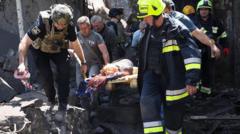In Russia, the 80th anniversary of the Soviet victory in World War II is celebrated amidst historical reenactments and patriotic fervor. However, the official narrative controversially frames the current invasion of Ukraine as a continuation of the fight against Nazism, shaping national identity and public opinion.
Commemorating Victory: The Dual Lens of WWII Remembrance in Russia

Commemorating Victory: The Dual Lens of WWII Remembrance in Russia
As Russia marks the 80th anniversary of WWII victory, the historical narrative intertwines with the ongoing conflict in Ukraine, illustrating complex national sentiments.
Eighty miles northeast of Moscow, a park resonates with simulated explosions and the clash of gunfire. As thick clouds of smoke arise, actors reenact the Red Army's siege of Berlin, an event pivotal to the Soviet victory over Nazi Germany in May 1945. This re-creation is among various commemorative activities for the 80th anniversary of what Russia terms The Great Victory. Observers gather at the shore, witnessing the fall of a symbolic swastika replaced by the hammer and sickle emblem.
Among the spectators, Katya shares her family's war legacy: her grandfather fought during WWII and was declared missing in action, revealing the profound personal connections to this historical period. With her son currently enlisted in what the Russian government calls a "special military operation" in Ukraine, parallels of conflict across generations are poignantly drawn. "He volunteered," Katya describes, aware that the weight of combat continues to affect her family.
As Russia celebrates its World War II triumph, the narrative articulates a juxtaposition between the past and present. Historically, the Great Fatherland War represents not only the USSR's resilience against Nazi aggression but also a cornerstone of Russian national identity, with over 27 million lives lost. These historical events are now framed by the state as part of a continuous battle against Western aggression, branding today’s military action in Ukraine as a righteous pursuit against contemporary ‘fascism.’
While the Kremlin envisions the conflict as an extension of historical struggles, the broader interpretation within Russian society sees the war in Ukraine through conflicting lenses. Major media channels propagate a narrative depicting the West as an adversary reminiscent of past antagonists, largely omitting critical historical context.
Notably, a new monument in Khimki symbolizes this amalgamation of past and present, portraying a soldier from WWII alongside one fighting in Ukraine. Commentaries from public figures echo sentiments of a nation steadfast against perceived external threats, with events leading up to Victory Day showcasing patriotic fervor.
In the days preceding the May 9 festivities, overt displays of national pride become ubiquitous. From symbolic decorations in public transport to military parades down Moscow's streets, the historical commemoration seeks to reinforce unity against external foes. Yet, amidst this exercise of national pride justified by a painful past, the realities of the ongoing conflict present a stark contrast: victory in Ukraine remains elusive for the Kremlin.
Elderly citizens like Fyodor Melnikov reflect on the pain of war without engaging in political disputes, remembering loved ones lost and advocating for peace. His poem, recounted in memory of his brother lost in the Great Patriotic War, highlights the often-overlooked human cost of conflict.
As Russia prepares to honor its past on this significant anniversary, the dual narratives of memory and ongoing conflict illustrate the complexities of national identity and the enduring impact of historical events on present-day society.




















